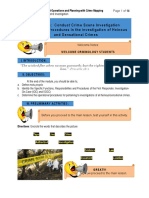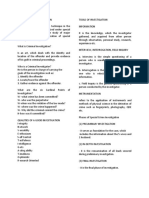Professional Documents
Culture Documents
Reflection - Crime Laboratory Duties and Functions in Crime Investigation
Uploaded by
Mary Irene TalaugonOriginal Title
Copyright
Available Formats
Share this document
Did you find this document useful?
Is this content inappropriate?
Report this DocumentCopyright:
Available Formats
Reflection - Crime Laboratory Duties and Functions in Crime Investigation
Uploaded by
Mary Irene TalaugonCopyright:
Available Formats
Ecot, Ronel
REFLECTION PAPER
On the 17th of October year 2020 a webinar with a theme Crime Laboratory: Duties and Functions in
Crime Investigation was held thru online virtual setting. Topics discussed was about the functions of crime
laboratories, its vision and mission, and the core values of PNP crime laboratory. The speaker PMAJ Ma. Lela P.
Carado highlighted about conducting forensic examination of all physical evidence.
I have learned that in a crime investigation there are certain tests needed to assess and evaluate a case.
Crime investigation plays a very important role in solving a case. This is where we can determine and visualize what
happened when the case was committed. One example of crime investigation test that is very vital during
examination is Medico-legal. This is a physical test where in a body is examined. The speaker also tackle about the
core values of a PNP Crime Laboratory. There should be Integrity where a crime investigator is doing the right
thing, no falsification of results, only legit information should be reported. Credibility, this is where the quality of
being trusted take into action, reliable and trustworthy results. Accuracy also must be considered, where in tests
should be done correctly and should result accurately.
The seminar also talks about the crime laboratory vision and mission. In this discussion I have figured out
in my own, as a future enthusiast, the Pros and Cons of being a Crime investigator. Being a criminal investigator is
one of the most rewarding careers. There are a lot of different areas of specialties that can be explored and finding
your niche isn't hard. Working in a crime laboratory is a great place to work, interesting work and rewarding at
times. I would possibly enjoy the culture and working with highly intelligent people, plenty to learn and plenty to
do.
On the other hand, serious crimes often happen outside of normal business hours. Therefore, it is not
unusual to get called back to work after analyzing evidence in the lab all day. No matter what the weather,
crime scene investigators are expected to meet police at the crime scene as soon as possible. Much of the work
happens at the scene of the incident in all types of weather. Crime scene investigators can be under intense
pressure from police to finish forensic reports. Caseloads are heavy in high crime areas. At times, the job can be
emotionally draining.
You will collaborate with law enforcement to process the crime scene. Duties involve collecting,
preserving, recording and analyzing evidence at the morgue or scene of a crime. Attention to detail and
accuracy are essential for gathering uncontaminated samples. The chain of evidence must be maintained for use
in criminal proceedings. Those who like detailed investigative work, and who can handle the sight of pools of
blood or other bodily fluids may best be able to handle the difficult circumstances of a violent crime scene.
Routine duties include cataloging, recording and forwarding carefully marked samples of hair, nails,
fibers or paint chips. Depending on the complexity of the situation, the crime scene investigator analyzes the
samples or sends them off to a toxicology or pathology lab for testing. Crime scene photos are also required.
Through careful observation and examination, the forensic technician can reconstruct the crime and help
pinpoint the perpetrator of the crime.
The work itself is methodical and unglamorous. Back in the lab, routine tests are conducted to analyze
DNA, fingerprints, tire tracks, shoe prints and blood splatters. Crime scene investigators painstakingly review
and interpret data for hours at a time. You must be confident in your skills and findings because you may be
asked to testify in court. One of the more stressful aspects of the job is being grilled by defense attorneys trying
to discredit your credentials and the results of your findings.
You might also like
- Alleged Shooting and Stabbing IncidentDocument33 pagesAlleged Shooting and Stabbing IncidentBoniwellBAmistad100% (3)
- ABAYON - Experiment 3 PDFDocument5 pagesABAYON - Experiment 3 PDFBrighton JohnNo ratings yet
- Different Forms of Report: Form No. 8Document11 pagesDifferent Forms of Report: Form No. 8Angelo Intak LobetañaNo ratings yet
- Unit Iii Tools of Criminal Investigation Four I's of Criminal InvestigationDocument12 pagesUnit Iii Tools of Criminal Investigation Four I's of Criminal InvestigationKian Flores100% (1)
- CBT Case Study PresentationDocument12 pagesCBT Case Study Presentationstefiano100% (1)
- (Sir alas-as'CDI 300 Module 1.docx'Document53 pages(Sir alas-as'CDI 300 Module 1.docx'chiberNo ratings yet
- Module CDI 4 ANSWERSDocument7 pagesModule CDI 4 ANSWERSJustine MarqNo ratings yet
- LEA 4 - Module 5Document15 pagesLEA 4 - Module 5Anthony EhaponNo ratings yet
- Lea 4 Module 7Document13 pagesLea 4 Module 7JpAguirreNo ratings yet
- Technical English Notes 1.Document9 pagesTechnical English Notes 1.Hazel Minardo Adorabl100% (2)
- Module 1 - Nature and Concept of Criminal InvestigationDocument10 pagesModule 1 - Nature and Concept of Criminal InvestigationRomie Boy MutyaNo ratings yet
- Forensic PhotographyDocument23 pagesForensic PhotographyNatiejane tottoNo ratings yet
- Cdi 3 NotesDocument4 pagesCdi 3 Notesyuan sanchezNo ratings yet
- Admission Procedure 1Document6 pagesAdmission Procedure 1juvy100% (3)
- Forensic 2 - Module 2Document7 pagesForensic 2 - Module 2Ronalyn PaunalNo ratings yet
- Crime Pattern TheoryDocument43 pagesCrime Pattern Theoryanaximans100% (1)
- Forensic 5 Module 2Document11 pagesForensic 5 Module 2Jane Casanillo 3204No ratings yet
- Chapter 10 - Sworn Statement FormatDocument6 pagesChapter 10 - Sworn Statement Formatkim ryan uchiNo ratings yet
- Chapter 4 CorrectionDocument41 pagesChapter 4 Correctionmae SipalayNo ratings yet
- OkumuraDocument3 pagesOkumuraJohn Winchester PalmonesNo ratings yet
- CDI-1, Chapter 2-Unit 2 SEARCH AND SEIZUREDocument24 pagesCDI-1, Chapter 2-Unit 2 SEARCH AND SEIZUREFREDERICK REYESNo ratings yet
- Historical Background of Industrial Security in The PhilippinesDocument9 pagesHistorical Background of Industrial Security in The Philippinesjohn acostaNo ratings yet
- Lea 4 Module 3 PDF 1Document15 pagesLea 4 Module 3 PDF 1JpAguirreNo ratings yet
- Nueva Ecija University of Science and TechnologyDocument6 pagesNueva Ecija University of Science and TechnologyCylla EspinozaNo ratings yet
- CDI 5 Learning Plan 5Document14 pagesCDI 5 Learning Plan 5ALEXNo ratings yet
- Forensic Chemistry: Kimberly Mae MirantesDocument25 pagesForensic Chemistry: Kimberly Mae MirantesBEST OF ONE PIECENo ratings yet
- The Rudimentary Square of Crime - Final PDFDocument14 pagesThe Rudimentary Square of Crime - Final PDFgodyson dolfoNo ratings yet
- B. Evidence Connecting QuestionDocument1 pageB. Evidence Connecting QuestionMagr EscaNo ratings yet
- Polygraphy-The Science of Lie Detection: College of Criminal Justice EducationDocument13 pagesPolygraphy-The Science of Lie Detection: College of Criminal Justice EducationIowa Jovan100% (2)
- Concept of Investigation: Criminal Detection and Investigation 1Document73 pagesConcept of Investigation: Criminal Detection and Investigation 1josh bahian0% (1)
- Inventory of Evidence Collected: Soco Report Form "4"Document2 pagesInventory of Evidence Collected: Soco Report Form "4"renjomarNo ratings yet
- Theories of Crime Causation Alexis R. Alcantara 2Document38 pagesTheories of Crime Causation Alexis R. Alcantara 2Alyssa SosangyoNo ratings yet
- PRELIMINARY EXAMINATION IN COURSE AUDIT 1 - Google FormsDocument15 pagesPRELIMINARY EXAMINATION IN COURSE AUDIT 1 - Google FormsAJ LayugNo ratings yet
- Investigation by The Territorial Police Unit After An Armed ConfrontationDocument2 pagesInvestigation by The Territorial Police Unit After An Armed ConfrontationRyan Matusalem100% (1)
- DactylosDocument10 pagesDactylosFloramae Celine Bosque100% (1)
- Instruments Used in Questioned Documents ExaminationDocument11 pagesInstruments Used in Questioned Documents ExaminationJENNIFER PADIERNOSNo ratings yet
- Lesson Title: Basic Types of Investigation Reports Lesson Objective: at The End of The Session, Students Are Expected - MaterialsDocument7 pagesLesson Title: Basic Types of Investigation Reports Lesson Objective: at The End of The Session, Students Are Expected - MaterialsJolena Fajardo SajulgaNo ratings yet
- Module - CRS 1Document22 pagesModule - CRS 1Magr EscaNo ratings yet
- Module 15Document9 pagesModule 15aya brea antalanNo ratings yet
- The Rudimentary Square of CrimeDocument12 pagesThe Rudimentary Square of Crimegodyson dolfoNo ratings yet
- History of Policing System PH and UsDocument5 pagesHistory of Policing System PH and UsMicaella MunozNo ratings yet
- Additional Lesson CDI 1Document8 pagesAdditional Lesson CDI 1Francis kharylle DegraciaNo ratings yet
- WTDocument4 pagesWTNina IliganNo ratings yet
- Special Crime InvestigationDocument11 pagesSpecial Crime InvestigationHurtley galidayNo ratings yet
- Lea (Dubai)Document21 pagesLea (Dubai)Retchel Mae Siete MaribaoNo ratings yet
- Ordeal Balance Ordeal Balance: Ordeal by Hot WaterDocument2 pagesOrdeal Balance Ordeal Balance: Ordeal by Hot WaterGina Portuguese Gawon100% (2)
- Lesson Five: Interview and InterrogationDocument23 pagesLesson Five: Interview and InterrogationHelen OfracioNo ratings yet
- RRLDocument12 pagesRRLDaylene DelebiosNo ratings yet
- Cdi 1 Lecture 2023Document47 pagesCdi 1 Lecture 2023Christian VeranoNo ratings yet
- Spot ReportDocument3 pagesSpot ReportMacMac Navarro Odiongan IINo ratings yet
- CRMTC 2NLDocument120 pagesCRMTC 2NLdulce amor herdilesNo ratings yet
- Non Institutional Correction ReviewDocument80 pagesNon Institutional Correction ReviewNickel ElerNo ratings yet
- Activity 8 - HairDocument2 pagesActivity 8 - HairBATILO MARC JOSEPH0% (1)
- Module (Cdi 1)Document54 pagesModule (Cdi 1)lian carla c. luzong100% (1)
- The Filipino P Olicemen: Foundation of Police EthicsDocument35 pagesThe Filipino P Olicemen: Foundation of Police EthicsAdriel Marasigan100% (1)
- Topic: What Are Drugs?: CDI 7: Vice and Drug Education and ControlDocument14 pagesTopic: What Are Drugs?: CDI 7: Vice and Drug Education and ControlSmith Blake0% (1)
- Ryan Case Folder 4Document17 pagesRyan Case Folder 4Sec CretNo ratings yet
- CLJ5 - Evidence Module 3: Rule 129: What Need Not Be Proved Topic: What Need Not Be ProvedDocument9 pagesCLJ5 - Evidence Module 3: Rule 129: What Need Not Be Proved Topic: What Need Not Be ProvedSmith BlakeNo ratings yet
- University of Baguio @FB - Jezreel Vicente (0977-8877-300) : Fundamentals of Criminal InvestigationDocument9 pagesUniversity of Baguio @FB - Jezreel Vicente (0977-8877-300) : Fundamentals of Criminal InvestigationQayes Al-QuqaNo ratings yet
- Crime LabDocument1 pageCrime LabJean Jamailah TomugdanNo ratings yet
- Class Report On Crime InterventionDocument5 pagesClass Report On Crime InterventionDionne LoftersNo ratings yet
- Ecot Ronel D - Goals of Criminal Justice SystemDocument1 pageEcot Ronel D - Goals of Criminal Justice SystemMary Irene TalaugonNo ratings yet
- Ecot Ronel D - Goals of Criminal Justice SystemDocument1 pageEcot Ronel D - Goals of Criminal Justice SystemMary Irene TalaugonNo ratings yet
- Ecot Ronel D - Goals of Criminal Justice SystemDocument1 pageEcot Ronel D - Goals of Criminal Justice SystemMary Irene TalaugonNo ratings yet
- Reflection - BJMP Duties and FunctionsDocument1 pageReflection - BJMP Duties and FunctionsMary Irene Talaugon100% (2)
- Ecot Ronel - Police Community RelationsDocument4 pagesEcot Ronel - Police Community RelationsMary Irene TalaugonNo ratings yet
- Sexual Harrasment ReflectionDocument1 pageSexual Harrasment ReflectionMary Irene TalaugonNo ratings yet
- This Webinar Taught Us On How Important Work Ethics A Student and A Future CriminologistDocument2 pagesThis Webinar Taught Us On How Important Work Ethics A Student and A Future CriminologistMary Irene TalaugonNo ratings yet
- Ronel D Ecot - LiteratureDocument1 pageRonel D Ecot - LiteratureMary Irene TalaugonNo ratings yet
- Ecot Ronel - Introduction To CriminologyDocument3 pagesEcot Ronel - Introduction To CriminologyMary Irene TalaugonNo ratings yet
- Natural Hazards & Disasters: General Science & Ability by CSS All in OneDocument20 pagesNatural Hazards & Disasters: General Science & Ability by CSS All in OneSam AwanNo ratings yet
- Explant Sterilization TechniqueDocument4 pagesExplant Sterilization TechniqueHaripriya88% (8)
- Medical Assistant Resume SkillsDocument6 pagesMedical Assistant Resume Skillsf5dbf38y100% (2)
- INFOKIT Future ForestDocument6 pagesINFOKIT Future ForestPOPNo ratings yet
- Case StudyDocument18 pagesCase Studyapi-259257079No ratings yet
- Lakewood Police Department Return To Work Decision MatrixDocument1 pageLakewood Police Department Return To Work Decision MatrixMichael_Roberts2019No ratings yet
- Senate BillDocument2 pagesSenate BillEliseo Salvador JrNo ratings yet
- Nitobond EP : Constructive SolutionsDocument4 pagesNitobond EP : Constructive SolutionsChidi OkoloNo ratings yet
- Code of Practice For Metal Decking and Stud Welding 2014Document30 pagesCode of Practice For Metal Decking and Stud Welding 2014joe briffaNo ratings yet
- Margaret Naumburg PapersDocument145 pagesMargaret Naumburg PapersmarianaNo ratings yet
- Manahaw Elementary School Child Protection PolicyDocument3 pagesManahaw Elementary School Child Protection PolicyRenelyn Rodrigo SugarolNo ratings yet
- In-Patient: Benefit ScheduleDocument2 pagesIn-Patient: Benefit Scheduledinda testNo ratings yet
- Izombie Rules (D20 Modern Variant Rule) : Zombie StatsDocument7 pagesIzombie Rules (D20 Modern Variant Rule) : Zombie StatsJames LewisNo ratings yet
- Literature Review: Terapi Relaksasi Otot Progresif Terhadap Penurunan Tekanan Darah Pada Pasien HipertensiDocument8 pagesLiterature Review: Terapi Relaksasi Otot Progresif Terhadap Penurunan Tekanan Darah Pada Pasien Hipertensinadia hanifaNo ratings yet
- CASESTUDY Pott's DiseaseDocument27 pagesCASESTUDY Pott's Diseasemae_kel100% (45)
- Hbo Midterm Exam Reviewer PDFDocument11 pagesHbo Midterm Exam Reviewer PDFMary Ellen LuceñaNo ratings yet
- Using in Children and Adolescents: BenzodiazepinesDocument4 pagesUsing in Children and Adolescents: BenzodiazepinesEunike KaramoyNo ratings yet
- Birth Class 11Document5 pagesBirth Class 11anushkaparashar85No ratings yet
- Reinforcement Theory of MotivationDocument10 pagesReinforcement Theory of Motivationimdad ullahNo ratings yet
- Bullard Environmental Racism 21st CenturyDocument5 pagesBullard Environmental Racism 21st CenturyAnonymous ZiFgJi3No ratings yet
- Jadbinder Seehra Periodontal Outcomes Associated With Impacted Maxillary Central Incisor and Canine Teeth Following Surgical Exposure and Orthodontic AlignmentDocument15 pagesJadbinder Seehra Periodontal Outcomes Associated With Impacted Maxillary Central Incisor and Canine Teeth Following Surgical Exposure and Orthodontic Alignmentcruzjulio480No ratings yet
- Rle Opd (Case Study)Document13 pagesRle Opd (Case Study)Quintin MangaoangNo ratings yet
- Standards-Procedures-Guidance - HAADDocument37 pagesStandards-Procedures-Guidance - HAADJeswin JoseNo ratings yet
- TESDA-OP-CO-01-F11 CBC Organic Agriculture Production NCII NEWDocument97 pagesTESDA-OP-CO-01-F11 CBC Organic Agriculture Production NCII NEWRomally Antonette TagnipezNo ratings yet
- Respirator Cartridge ChartDocument2 pagesRespirator Cartridge ChartRanto GunawanNo ratings yet
- Strategic and Technical Advisory Group For Noncommunicable DiseasesDocument51 pagesStrategic and Technical Advisory Group For Noncommunicable DiseasesabarmasNo ratings yet
- Health History and Immunization Form: University of Valley Forge - Health CenterDocument4 pagesHealth History and Immunization Form: University of Valley Forge - Health CenterBernard AmetepeNo ratings yet
- How To Make Your Girl Squirt EffortlesslyDocument80 pagesHow To Make Your Girl Squirt EffortlesslyKimberly63% (8)
- 1b Cas Interviews Worksheet Template and Sample 1Document2 pages1b Cas Interviews Worksheet Template and Sample 1Rania ShabanNo ratings yet
































































































